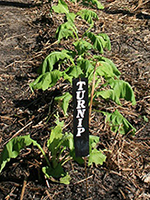
Many traditional garden veggies can't take the summer heat.
Heat Tolerant Vegetables
Seasonal rains, humid summers, and sandy soils make edible gardening in Florida a challenge. Choosing the right crops, and the right varieties, can make all the difference in your vegetable garden.
For some crops there are Florida-appropriate varieties to choose from. Molds and mildews are a persistent problem during our rainy summers. Crops that advertise themselves as disease- or fungus-resistant make a difference. For crops generally grown up north, look for "low chill hour" varieties. If the space between too-early-to-plant and harvest time is small, consider an early-maturing cultivar.
Some crops, however, just aren't adapted to Florida gardening. This is particularly true if you live in the lower half of the state. But don't despair! What Florida lacks in traditional crops it more than makes up for in vibrant and delicious tropical fruits and vegetables.
Below are some "better for Florida" crops that will make you glad to garden in the Sunshine State.
Root Vegetables
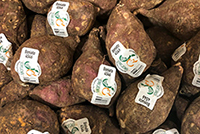
Boniato is a popular crop in South Florida.
Truth be told, carrots, potatoes, beets, and turnips can't take Florida's summer heat. Up north they may be staples in the June veggie patch, but here they're winter crops. For some summer alternatives, consider sweet potato, boniato, and cassava.
Boniato is a relative of sweet potato and very popular in South Florida. It can be used as a sweet potato substitute in recipes. The main differences are color and texture. Boniato's flesh is white and fluffier than sweet potatoes.
Cassava, also called yucca or manioc, produces edible starchy, tuberous roots. They're prepared after boiling and then baked, mashed, or fried, like potatoes.
Leafy Greens
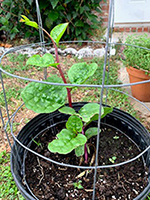
Malabar spinach is a fast-growing tropical "spinach." Mary Splain
When temperatures climb, amaranth and tropical spinaches are at their best. These greens are good substitutes for cool-weather collards and spinach. Did you know sweet potato leaves are edible, too?
Amaranth greens, also called callaloo (A. gangeticus) are commonly eaten as boiled greens. The striking tricolor variety deserves a place alongside your ornamentals, too.
Tropical spinaches are cold sensitive but in South Florida they may be grown as perennials. Species include Malabar spinach (Basella alba and B. rubra), Okinawa spinach (Gynura crepioides), longevity spinach (Gynura Procumbens), and more. While not true spinaches (that would be Spinacia oleracea) they can keep you harvesting leafy greens all summer long.
Squashes
Despite its name, "summer squash" doesn't thrive in Florida during the summer. But long after it's too hot to plant zucchini, tropical squashes thrive.
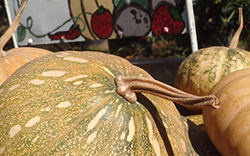
Seminole pumpkins are a variety of Cucurbita moschata. Sally Lanigan, UF/IFAS.
Calabaza, Seminole pumpkin, long squash, chayote, and luffa could be the stars of your summer garden instead. Stored indoors, Seminole pumpkins and calabaza will last long enough to be used at Halloween and Thanksgiving. And if your luffa grows too tough to eat, let them dry out and you'll have sponges for months.
Tomatoes
This popular vegetable is another crop that doesn't perform well in our steamy summer months. Wilts, pests, and the relentless summer heat all contribute to gardeners' struggles growing tomatoes. Instead of traditional varieties, try tomatillo, cherry tomatoes, or Everglades tomato. For a more traditional tomato crop, 'Heat Wave II' and other heat-tolerant varieties are good options.
Beans and Peas
Beans and peas are among the easiest plants to grow and saving seeds is a breeze. Southern peas, winged bean, long bean, and tropical pole beans are good choices for summer gardens. Heat-tolerant varieties of pole and bush beans are also available.
As legumes, these beans and peas also fix nitrogen in the soil. They make good summer cover crops, enriching the soil for your cool-weather plantings. Climbing beans like those above are also a component of the iconic American planting: the three sisters.
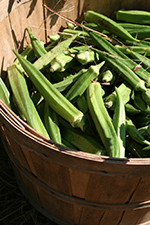
Okra, Southern staple.
Uniquely Florida
Florida's subtropical climate lends itself to fruits and vegetables that you rarely find elsewhere in the continental US. To make the most of our warm weather, try summer crops like okra, roselle, sugarcane, and tropical fruits. Exotic plants like these help Florida gardeners celebrate and enjoy what makes our state unique!
Where can I find seeds?
Seeds for some of these less-common plants are not generally found in nationwide big box stores. Instead, look for them in local garden stores, southern-specializing seed catalogs, and plant swaps. For more ideas for finding uncommon seeds, check out our article on seed sources.
For more information on summer vegetable gardening, contact your county Extension office.
Also on Gardening Solutions
UF/IFAS Sites
- Backyard Sugarcane in the Panhandle -- UF/IFAS Extension Gulf County
- Fact Sheet: Okinawa Spinach -- UF/IFAS Extension Nassau County
- Growing Tropical Squash in Florida -- UF/IFAS Extension Osceola County
- Tiny But Tough: The Everglades Tomato -- UF/IFAS Extension Charlotte County

